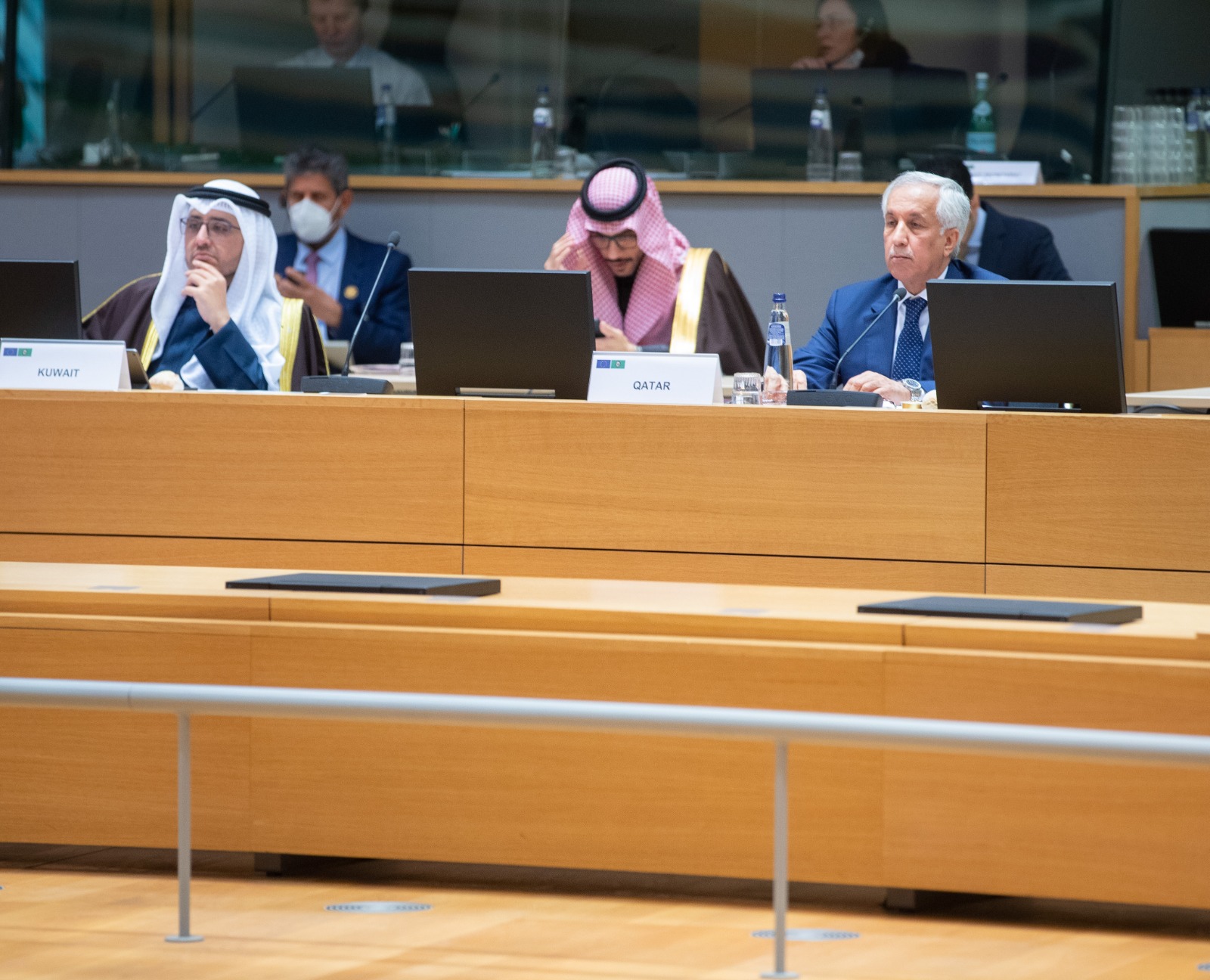Qatar Participates in 26th GCC-EU Ministerial Meeting

Brussels / Information Office / February 22
The State of Qatar participated in the 26th session of the Joint Council and Ministerial Meeting of the European Union (EU) and the Cooperation Council for the Arab States of the Gulf (GCC) held in the Belgian capital, Brussels.
The State of Qatar was represented in the session by HE Minister of State for Foreign Affairs Sultan bin Saad Al Muraikhi.
In the State of Qatar's speech at the outset of the session, His Excellency said that the meeting embodies the common concern and the sincere desire to continue cooperation and enhance discussion to advance relations between the GCC and the European Union to broader horizons.
His Excellency pointed out that the meeting is held during a period where the world is experiencing great and unprecedented challenges on various levels, including economic, health, environmental, and security.
With the continuation of COVID-19 and its economic effects, the pace of climate change, and the escalation of tensions in a number of regions of the world, there is a need for concerted efforts of the international community to deal with these issues within the framework of international cooperation, which regional blocs such as the GCC and the EU play important roles, HE explained.
His Excellency pointed out that the development of relations at the joint ministerial council level allows both regional blocs to operate from a position of strength in the international arena, which facilitates addressing issues of common interest in various fields.
HE Minister of State for Foreign Affairs said that the GCC countries are not isolated from the challenges of our time, most notably climate change, and pointed out that the GCC countries are located in one of the driest regions in the world. With this, the State of Qatar has paid great attention to environmental issues and climate change, which constitute the fourth pillar of Qatar National Vision 2030.
In this regard, the State of Qatar has developed a national strategy for the environment and climate change that sets environmental goals and objectives that it seeks to achieve in all fields, including reducing the country's emissions to 25 percent by 2030, HE added.
His Excellency stressed the importance of strengthening cooperation between the GCC and the EU in the field of combating climate change to benefit from the experiences and expertise of the EU in combating and preventing the effects of climate change.
His Excellency explained that the GCC countries are facing the challenge of economic diversification and reducing dependence on oil and gas revenues as main sources of income, especially in the phase of energy transition and the gradual transition towards clean energy sources, which requires the GCC countries to accelerate the diversification of their economies and move towards more diversified and sustainable sources of income.
The green economy can be presented as a tool for sustainable development, economic diversification, and the fight against climate change, HE said.
His Excellency referred to the State of Qatar's recent announcement of the Green Economy Roadmap launch which serves as a comprehensive vision for developing policies and procedures to achieve a green economy and builds a platform for procedures and joint cooperation in the future.
On the international level, the State of Qatar continues to support the green economy. The Qatar Fund for Development (QFFD) signed a collaboration agreement with Global Green Growth Institute (GGGI) to support small island developing states and the least developed countries in the creation of green jobs and development of green industries and assist the agricultural sector to support food security in these countries, HE added.
HE the Minister of State for Foreign Affairs said that areas of economic diversification and the green economy represent a fertile field for cooperation between the GCC and the EU and strengthening strategic investment partnerships between the Gulf and European countries.
His Excellency stressed that work in the field of humanitarian aid represents a field for cooperation, partnership building, and coordination between the GCC and the EU to strengthen international efforts to support developing countries and bridge rifts in areas of conflict, which provides an opportunity to embody human values, an important entitlement towards our common destiny and towards building world peace.
The State of Qatar has great experience in the humanitarian field, His Excellency pointed out. From 2012 to 2021, the QFFD provided development and humanitarian contributions to more than 100 countries around the world, and the total contributions of the State of Qatar during that period amounted to approximately 5.6 billion US dollars, HE explained.
His Excellency stressed that he is certain that despite the many intertwined and complex challenges in the contemporary world today, we also live in a time full of tremendous opportunities to move forward with confidence and positivity in our common endeavor to address climate change and cooperate in the health, economic, environmental, energy, peace, and global security fields by creating new forms of cooperation.
His Excellency extended his thanks and appreciation to the EU and the organizers of this meeting for hosting the 26th session of the Joint Council and Ministerial Meeting of the European Union (EU) and the Cooperation Council for the Arab States of the Gulf (GCC) and for the efforts made to prepare for this session.
At the conclusion of his speech, His Excellency wished the meeting success in its deliberations and outcomes and for the people of the GCC and EU and all humanity further growth, prosperity, peace, and security.

